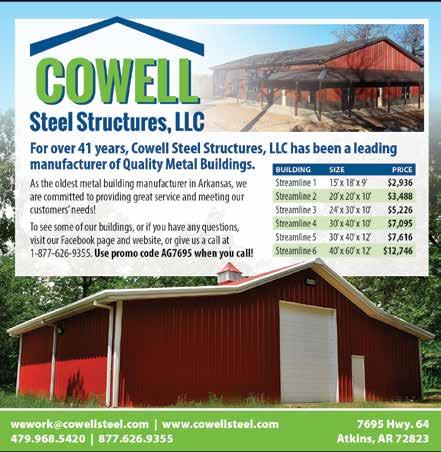
4 minute read
Policy Column: The Road(s) to a Better Future
By Jessica Clowser Burkham, Director of Policy Development and Legislative Research for Arkansas Farm Bureau

Jessica Clowser Burkham grew up on a registered Angus cow/calf operation in Nebraska. She spent six years in Washington, D.C., working as a legislative assistant for U.S. Sen. Deb Fischer of Nebraska, where she advised on legislative issues for the Senate Agriculture, Nutrition and Forestry Committee and the Senate Environment and Public Works Committee. She also managed the senator’s legislative priorities in agriculture, energy and environment, water infrastructure, biofuels and trade policies and worked to negotiate and advance priorities for the 2014 and 2018 Farm Bills.
Areliable infrastructure network is critically important for Arkansas’ agriculture producers. Highways expand and strengthen interstate commerce, which is vital for the movement of goods in and out of Arkansas and from farm or ranch to market. This is important because agriculture is the economic engine of our state and our hardworking farmers, ranchers and forest products producers depend on the effective transportation of products to provide for their families.
In early 2019, the Arkansas General Assembly approved two highway funding related pieces of legislation. The first, HJR 1018, referred to as Issue 1, is a legislatively referred constitutional amendment, which will appear on the Nov. 3, 2020 general election ballot. Currently, Arkansans are paying one-half percent (.5%) – or half a cent – sales and use tax for the purpose of funding infrastructure projects in the state. Issue 1 is simply a continuation of current law, paying half a cent sales tax to fund state highways, bridges, county roads and city streets.
Essentially, a “yes” vote for Issue 1 would support the continuation of the current half-percent sales tax that is set to expire in 2023. A “No” vote would reject the continuation of the current half-percent sales tax beyond 2023.
In addition to HJR 1018, the Legislature approved SB 336, which was signed into law by Gov. Asa Hutchison and is now referred to as Act 416. Act 416 was approved with the intent “to provide additional revenue for the maintenance and repair of highways, streets, and bridges in the state.” Among its provisions, Act 416 establishes a wholesale tax of 24.5 cents per gallon on gasoline and a wholesale tax of 28.5 cents per gallon on diesel. This tax does not apply to off-road diesel. Moreover, Act 416 mandates an additional registration fee of $100 for hybrid vehicles and $200 registration fee for electric vehicles. Finally, Act 416 transfers casino tax revenue in excess of $31 million annually, with a minimum of $35 million, to the State Highway Fund. Arkansas Farm Bureau strongly supports both Issue 1 and Act 416.
Under the combination of Issue 1 and Act 416, the total new revenue generated for Arkansas’ surface infrastructure projects and maintenance is $410 million. This is extremely significant given the current state of Arkansas’ state and county roads. Of the $410 million, $300 million will be designated for the Arkansas Department of Transportation (ArDOT) and the remaining balance of $110 million will be split between the counties and cities. Targeting these dollars in the most effective manner will provide a stronger surface transportation network across the state. To ensure ArDOT, as well as our cities and counties, receive these dollars, Arkansas Farm Bureau has teamed up with a coalition that is working diligently to get Issue 1 across the finish line in November 2020. On Nov. 15, the campaign – referred to as Vote for Roads. Vote for Issue 1 – was formally announced and officially kicked off the year-long focus to approve Issue 1 as an amendment to the Arkansas constitution. For this effort, Arkansas Farm Bureau has joined together with the Arkansas State Chamber of Commerce, Arkansas Trucking Association, The Poultry Federation, Associated General Contractors of Arkansas, Arkansas Asphalt Pavement Association, Associated Builders and Contractors of Arkansas, Northwest Arkansas Council, American Traffic Safety Services Association, and the American Council of Engineering Companies of Arkansas. As you can see, this is a diverse group which encompasses multiple industries, illustrating the importance of Issue 1. In addition to joining the coalition, Arkansas Farm Bureau, through its Voluntary Issues Fund, has provided monetary support for the Vote for Roads. Vote for Issue 1. campaign. The Voluntary Issues Fund has made a huge difference with previous legislative issues, ballot questions and amendments to the Arkansas Constitution. This fund cannot be used for personal or individual contributions, but is in place to advance the priorities of our Arkansas Farm Bureau members.
In the months ahead, the Vote for Roads. Vote for Issue 1. campaign will focus on educating Arkansas voters on the need for a safe and dependable infrastructure system. Additionally, ArDOT will host twelve open-forum, community events around the state including: Monticello, West Memphis, Harrison, The Road(s) to a Better Future
Texarkana, Mena, Fort Smith, Hot Springs, Maumelle, Springdale, Batesville, Jonesboro, and El Dorado. Farm Bureau strongly recommends you attend the event located in, or near, your community to learn more about Issue 1 and the importance of its approval on Election Day 2020. Without a long-term, reliable funding solution for transportation projects, Arkansas ag producers cannot do what they do best: feed the nation and feed the world. A strong surface transportation network is great news for the entire state and will only lead to greater economic development across all industries throughout Arkansas. *


